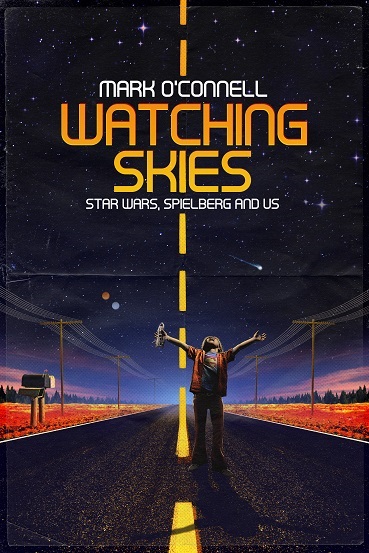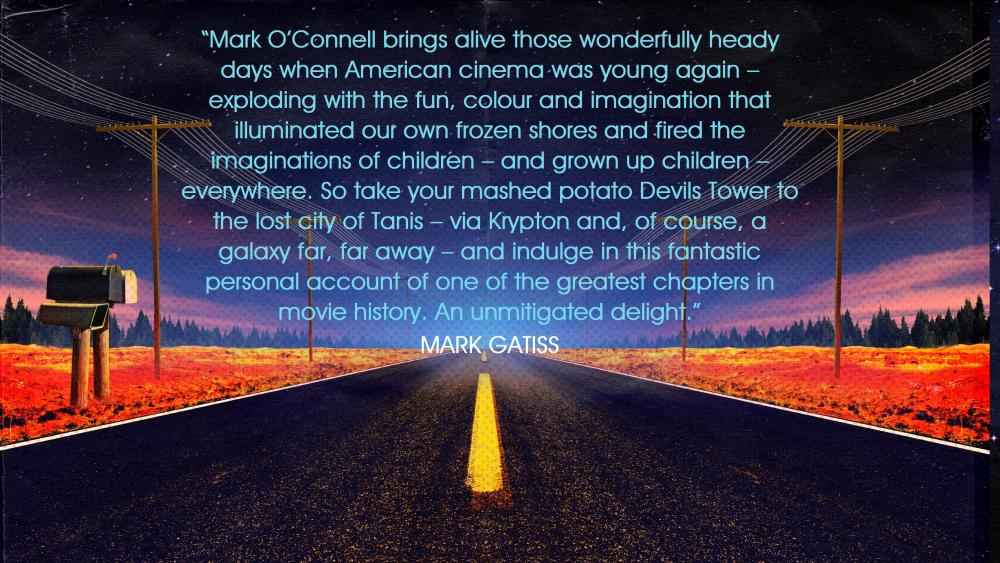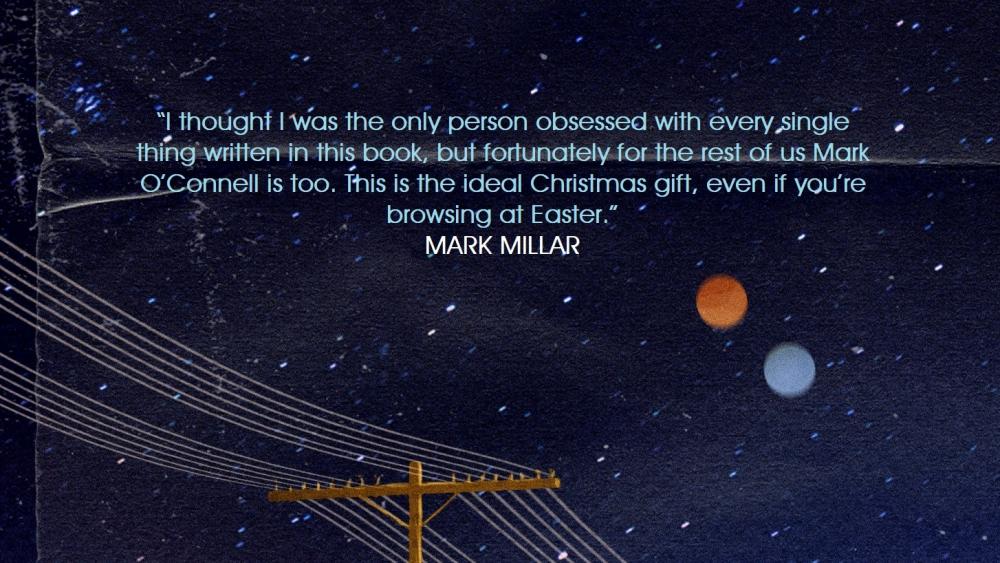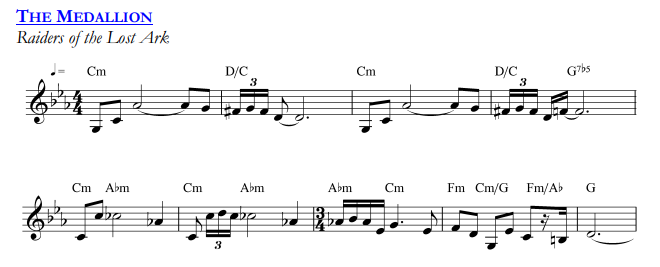Search the Community
Showing results for tags 'Raiders of the Lost Ark'.
-
Hi to all JWFN members. It is great to see such dedication and knowledge to the man who has scored more than just the movies. On that note The History Press and I would like to share word of a new book published now in the UK and September 1st 2018 in the US. John Williams is the spine and soul of this book. Mark O’Connell didn’t want to be Luke Skywalker. He wanted to be one of the mop-haired kids on the Star Wars toy commercials. And he would have done it had his parents had better pine furniture and a condo in California. Star Wars, Jaws, Close Encounters of the Third Kind, E.T. The Extra Terrestrial, Raiders of the Lost Ark and Superman didn’t just change cinema – they made lasting highways into our childhoods, toy boxes and video stores like never before. In Watching Skies, O’Connell pilots a gilded X-Wing flight through that shared universe of bedroom remakes of Return of the Jedi, close encounters with Christopher Reeve, sticker album swaps, the trauma of losing an entire Star Wars figure collection and honeymooning on Amity Island. From the author of Catching Bullets – Memoirs of a Bond Fan, Watching Skies is a timely hologram from all our memory systems. It is about how George Lucas, Steven Spielberg, a shark, two motherships, some gremlins, ghostbusters and a man of steel jumped a whole generation to hyperspace*. *Action figures sold separately. From examining his contributions to these key films, the soundtracks to broken homes and the VHS revolution to seeing the musical DNA from JANE EYRE all the way through to ATTACK OF THE CLONES, WATCHING SKIES is as much about John Williams as it is Spielberg, Lucas and Donner. It is about how 'Leaving Home' was exactly the cue going through the author's life and mind when he did just that, how the 'Love Theme from Superman' had to be played at a Pinewood Studios wedding, how 'ET and Me' scored a divorce and how a honeymoon on Amity Island couldn't help but hear those JAWS 2 harps at every street corner and beach rock. Were it not for the work of Williams, this book and these movies would not exist with the same legacy they have today. WATCHING SKIES - STAR WARS, SPIELBERG AND US is available now. WATCHING SKIES on Facebook WATCHING SKIES on Twitter For more about WATCHING SKIES and author Mark O'Connell
- 4 replies
-
- Watching Skies
- John Williams
- (and 10 more)
-
picture from @Falstaft's theme collection "The Medallion" theme is a seductive melody full of teasing by minor sixth leaps, triplets, and slow descents, and at first playful, sharpened notes, and then by relaxing flattened notes. It's in a (romantic) key full of flats, and the choice of Eb major in particular over neighbouring keys comes in handy in the finale, when the theme seemingly briefly portrays the 'raiders'' triumph in achieving their objective. Eb major has no significance in relation to the instruments that it is voiced in, as far as I was able to find, so the choice is rather likely to be dramatic than stricte utilitarian. The chord structure seems rather inconspicuous. It follows Williams' trend of harmony accompaniments of love themes, maybe slightly more on the mysterious side. The rhytm change in the pivotal moment of the theme and the "open" ending on a III (G) chord seems to give a glimpse of something; a promise of a shift with an ending left unknown. It is first heard voiced by a voxine cor anglais, lower in pitch and so closer to a seductive direction than an oboe would be. The point of this post is that the interpretation that Williams wrote a rather elaborate theme for the medallion, which does not play in the inscription reading scene in Cairo, or when major Toht shows the mark on his burned hand, or in the map room scene (!) and only plays for a nebulous reason in the finale, is rather suspicious, and that I think I have found a better explanation of what it represents. Part 1: We first hear it when Marion looks at the golden medallion and considers selling it. It starts playing when the medallion is shown, but then she looks at it on one hand and on money in the other hand (literally), and contemplates for a moment. It stops playing when she leaves the medallion on the table and walks away with money. It plays again when Indy and Sallah are carrying the Ark away in the Well of Souls, and the camera follows the shadow cast by them. They look like cartoon thieves. We finally hear it when Belloq, a man who likes luxuries, sells his morality for money, and dreams of possessing a "radio to God" for not exactly pious reasons, is amazed by his apparent victory and the ghostly visions. I am convinced that It is not a motif of the physical object (the medallion), but rather a theme of sin. The weak point of the interpretation is that in the second instance Indy and Sallah have no ill intentions. But a theme of sin playing still makes more sense than an unrelated medallion theme, doesn't it? We can definitely look for clues in why does 'The Medallion' theme play in the finale. We know that Williams likes to plan writing music based on where it is going, based on the end. He did it on larger scale just a year later---in E.T.... So let's analyze the logic of the theme succession in the track The Miracle of the Ark: Following the textbook use of themes in this score and the apparent narrative logic, since Indy and Marion are powerless in the finale, their themes do not play; the only themes at play are those about the active parties: God, the ghost maidens, and... the Raiders, apparently. The Nazi menace theme cannot play, because the goons throw down their weapons and look around scared. The suggestion that the "Medallion Theme" plays simply because it is a part of the Ark magic doesn't seem very convincing to me. I don't think it's the "sounds nice" Yoda's Theme situation in the Cloud City from a year prior either. Yoda's theme was something special for Williams, while the 'Medallion Theme' was confined to the film and never heard from again. The theme is a triumphant statement with extremely agitated strings and proud horns. It plays after the 'mortal danger' rendition of the Ark theme---God's last warning to the Raiders----and is directly preceded by a figure based on a romantic theme from Dracula; a figure which portrays the dance of the beautiful ghost maidens [btw. there was a glimpse of it already in the winds in Map Room Dawn]. I think that in this context the statement of the theme clearly portrays the overwhelming human urges that Belloq feels. It's a seeming triumph of the very worldly desires of the Raiders of the Lost Ark. The final tone is held long, as if God's offer still remained open, until it is proven beyond question that the conviction of the villains is unshakable. The Ark theme responds with a boil [on the album and in the cut that Williams scored, anyway; they clearly later cut out these few seconds of the film for a more drastic surprise value], and a shower of murderous atonal clusters follows; all the villains are wiped out. These clusters do not appear to have any connection to the theme. Raiders of the Lost Ark has some rather obvious symbolism concerning the theme of God punishing or rewarding depending on morality (the Hakenkreuz on the Ark crate is burnt off, people who opened the Ark are killed, ropes of the innocent Indy and Marion are burnt away). And since Williams conceptualised the Ark theme as a devillish tritone inside a perfect fifth, is a theme of a temptation to sin so far away? Some might instinctively object to Williams writing a theme about such an abstract concept as sin, but the entire score is full of beckoning, mystery, and romance, starting already with the jungle opening, and including the Ark theme itself. Secondly, since the love theme is quite bitter-sweet and "bruised", and Indiana Jones's heroic theme is frequently described as overcoming character's failures, we can conclude that the musical themes in Raiders are a bit deeper than, say, Star Wars OT themes. For these two reasons already I don't think a theme of sin in this particular score it is a far-fetched proposition. Part 2: There are no indications in the transcript of the story room discussions whatsoever that the medallion has any significance or qualities other than as a physical McGuffin that leads to the Ark. I doubt Spielberg or Lucas would have asked Williams to write a theme for it. An early draft of the script describes the scene introducing the theme so: It is more likely that they would highlight to Williams that Marion contemplates the artifact and the money. The storyroom transcript says about Marion: and about Belloq: and, for a contrast, about Jones: So a theme of sin might play for Marion and for Belloq, but is unlikely to play directly for Jones. This is consistent with my interpretations of the 3 uses of the theme in the film. The only alternative of what happened in the spotting session I see is that they asked Williams to write a theme highlighting the artifact, and Williams dropped the theme in all further meaningful contexts, but decided to use it in two random moments instead. We all know the fandom memes, but cmon, this would be some sort of a record at the time. Truth be told, the story room conversations of George Lucas, Steven Spielberg, and Larry Kasdan are centered on the pulp adventure and don't touch on the religious or serious aspect of the film too much. The conversations between Kasdan, Phil Kaufman, and Debby Fine, on the other hand, go very deep into literary sources and the historical context. That the thoughts about the mystical elements of the film underwent some maturation over time can be seen in the effects of scenes such as that of the introduction of the Ark to the Washington agents. Initially the agents were supposed to be the ones convincing Jones about a military danger of the Ark, and in the film proper they are the ones slowly realizing that the biblical Ark might be real and have some power when Jones tells them about the wrath of God. But let's return to the composition level. Williams' McGuffin and non-human themes tend to be short (Shark, Death Star, Hoth, The Ark). This one is much longer, and is very voxine and lyrical, as if it was expressing human emotions, or speaking to a character's thoughts. If it was a theme for the medallion, what would his decisions about the content of those bars mean? Why would it be in the romantic Eb major and not in C minor, like the ark theme, or in a mysterious G minor? And why such "whimsical" triplets? The medallion itself has no effect on Marion, other than as a sentimental trinket. I don't think Williams wanted to say that God tries to make Marion desire the artifact, since throughout the entire film God only ever warns people and tries to scare them away from the Ark. What she wants is the money, for which she is willing to sell the semi-sacred medallion (and the Bible really frowns upon such motivations---see: the wrath of God at the end). Williams worked deliberately and for quite some time to make this melody very good, note after a note, and express what he wanted it to express. He probably spent hours working on this. It's tight and on a Tchaikovsky level. Every other theme in the film is constructed very deliberately to express what it accompanies. It would be inconsistent if this one did not. But in the end, there is no definitive proof. It's a leap from the lion's head either way. So... what do you think, gents? Should the "Medallion Theme" henceforth be known as the Theme of Sin?
-
The Duel of the MacGuffins, or Williams scoring the god of the Old vs. the New Testament. (don't know how prone we are to religious flamewars, so I'll just stick to this) The Ark theme is very enjoyable with many great renditions. I consider it the villain theme of Raiders. To me, it communicates "You're meddling in things you should not be meddling in. If you so much as blink wrongly I will smash you like an ant." Uncovering the Ark is not a triumphant moment, it is quite dark and foreboding, like Indy and Sallah just released an ancient evil. The only semi-nice version is the finale of Miracle of the Ark, when the nazis are dead, and Indy and Marion finally submit to the rules, so the Ark benignly does not strike them down. The Holy Grail is the penultimate goal of any adventurer, the perfect career peak for Henry Jones and Jr., and I think Williams communicates this perfectly. The theme is very reverent and distant at first, not even played too many times, but becomes triumphant, warm and embracing once Indy makes the wise choice, then heals his father, and the final, full rendition as they leave the temple is a combination of these two. I personally prefer it over the Ark. Any other thoughts?
- 25 replies
-
- John Williams
- Indiana Jones
-
(and 2 more)
Tagged with:









